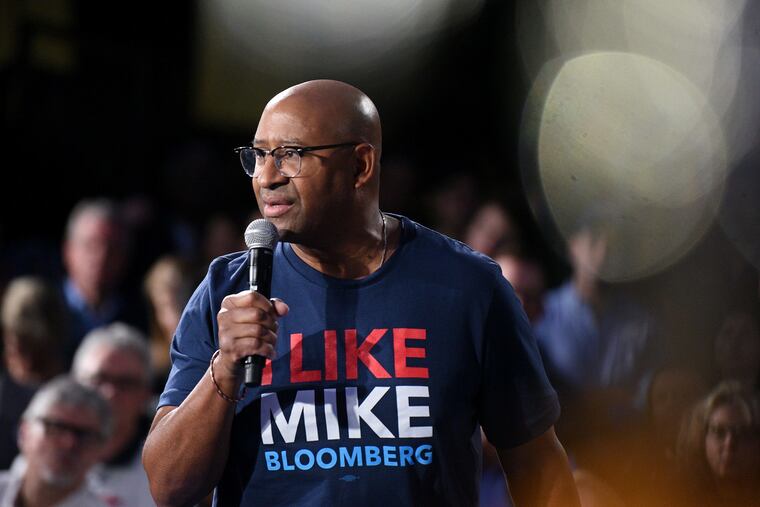Michael Bloomberg apologized for ‘stop and frisk.’ Don’t expect his surrogate Michael Nutter to do the same.
Former Philadelphia Mayor Michael A. Nutter, now Bloomberg’s campaign chairperson, helped craft the speech in which Bloomberg apologized for stop-and-frisk. But you won’t hear that kind of apology from Nutter about the use of the tactic in Philly during his eight years as mayor.

Last year, as he prepared to launch his presidential campaign, Michael Bloomberg spoke at a black megachurch in Brooklyn and bluntly apologized for the use of the controversial police tactic known as “stop and frisk” during his tenure as mayor of New York City.
“I was wrong,” Bloomberg told congregants at the Christian Cultural Center. “And I am sorry.”
Former Philadelphia Mayor Michael Nutter, who is now Bloomberg’s campaign chairperson, helped craft the speech and is one of Bloomberg’s top surrogates on the issue. But you won’t hear Nutter apologize for the use of stop-and-frisk during his eight years as mayor.
In an interview Wednesday, Nutter defended stop-and-frisk as a “constitutionally allowed strategy and tactic” that was one of many tools used by police during his tenure.
As mayor, he said, “you are responsible for public safety. You must do everything you can, legally, to reduce violence.”
Nutter, however, said he would apologize to any Philadelphians who were abused by police in stop-and-frisk encounters.
“I certainly would apologize to any person who was treated inappropriately, or felt that they were treated inappropriately, but again, the focus of the effort is trying to do everything we could, legally, to reduce violence,” he said.
In 2013, a federal judge found that New York’s stop-and-frisk program violated the Constitution because it targeted minorities for stops without reasonable suspicion they had committed crimes. The ruling, however, didn’t find that all stop-and-frisk policies are unconstitutional. New York revised its policy, and the practice is still used by police there and in Philadelphia.
Bloomberg is facing renewed criticism over stop-and-frisk following the release of a 2015 audio recording in which he justified the policy and discussed violence and race in blunt terms.
“Ninety-five percent of your murders — murderers and murder victims — fit one M.O. You can just take the description, Xerox it, and pass it out to all the cops,” Bloomberg says in the clip. “They are male minorities, 16 to 25. That’s true in New York. That’s true in virtually every city. ... And that’s where the real crime is. You’ve got to get the guns out of the hands of the people that are getting killed.”
A key strategy for Bloomberg — whose late entry into the race meant he missed the early state contests — is to appeal to African American voters, a vital Democratic constituency. Nutter said that recent polls show Bloomberg as the second choice among black voters, after former Vice President Joe Biden. How Bloomberg weathers the controversy surrounding the audio recording could play a significant role in his campaign.
Just as stop-and-frisk continues to dog Bloomberg, the issue has not gone away in Philadelphia politics, either. Mayor Jim Kenney has faced criticism from criminal justice reform advocates for abandoning his campaign promise to end the tactic once he took office replacing Nutter.
City Councilmember Cherelle L. Parker has written legislation that would let voters decide whether to ban unconstitutional stop-and-frisk in the city through a referendum on the Nov. 3 ballot.